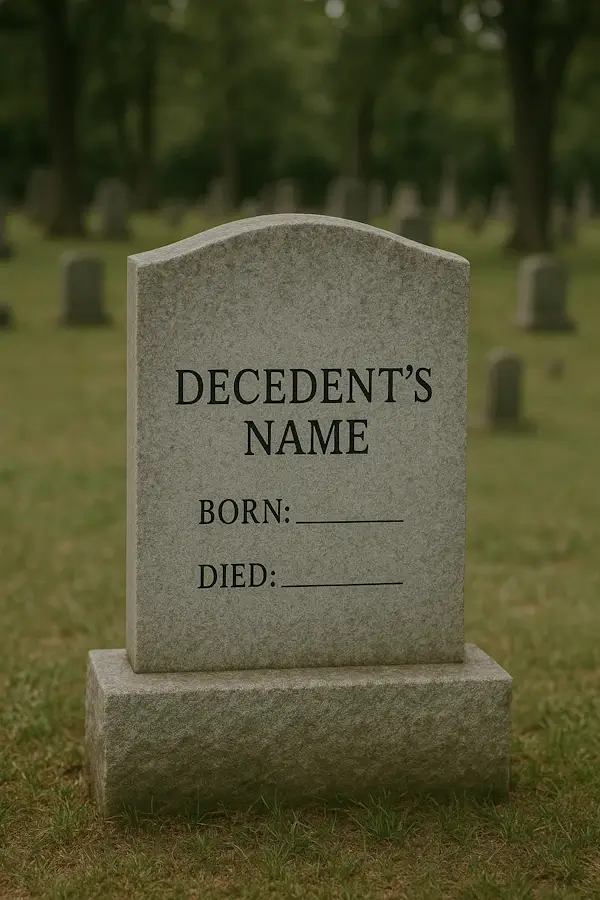Funerals
Show Table of Contents
In most provinces, a person named in a will as executor is legally responsible for arranging the funeral. There are a number of province-specific websites and books that provide excellent advice on arranging funerals, but here are a few starter tips:
Planning
At a time when you may be dealing with numerous other issues, not to mention needing time to grieve, arranging a funeral can be a lot of work. Don't try to do handle all this yourself; enlist other friends or family to help with the arrangements, getting the word out, and so forth. If the decedent was a veteran, there are additional resources available as well.
Be aware that some people plan their funerals in advance (sometimes decades before the funeral is actually needed). It's worth a quick investigation to see if such arrangements have been made, and if the decedent set up an EstateExec estate in advance, check the Funeral Wishes attachment on the Decedent tab.
Burial or Cremation
If you know whether the decedent preferred burial or cremation, it's best to honour those wishes. If you don't know what the decedent wanted, you can check the will, other related legal documents (e.g., Advance Care Directive, Personal Directive, Continuing Power of Attorney for Personal Care, etc.), or the presence of prepaid arrangements in the decedent's papers.
Burial: Traditional burial is more expensive and involved, but the funeral home or mortuary can guide you through the process.
- All together, a traditional burial will likely add $5-$8K to the cost of a funeral (including such things as the burial plot, burial marker, a burial vault for the casket, the actual burial, etc.).
- If desired, you can save significantly by opting for a direct burial, in which the decedent is buried shortly after death, without the funeral home providing an extended viewing or service.
- Newer "green" burial options avoid embalming the deceased, ensure the caskets are not decomposition-resistant, and rather than a traditional a grave marker, a tree may be planted above the gravesite as a memorial (see Green Burial Council).
Cremation: The majority of deaths in Canada are now handled via cremation (74% in 2022), which is substantially less expensive than burial. Direct cremation typically costs $1K-$2K, although electing a fancy container to hold the ashes will increase the price somewhat. Aside from price, another benefit of cremation is that rather than having to rush to hold an immediate burial service, you can hold a memorial service whenever you want, perhaps after things settle down a bit, out-of-town relatives can arrange to return, and so forth.
- Typically costing $1K-$2K (excluding any burial plot or memorial service), cremation is substantially less expensive than burial, although electing a fancy container to hold the ashes will increase the price somewhat.
- Rather than having to rush to hold an immediate burial service, cremation allows you to more naturally hold the memorial service whenever you want, perhaps after things settle down a bit, out-of-town relatives can arrange to return, and so forth.
- Discount $$: Some people store the ashes in memorial urns, some people inter the ashes in a cemetery, and others scatter them in meaningful places (restrictions apply). Better Place Forests offers another alternative, via "Memorial Trees" in protected forests (a Memorial Tree is an established, growing tree that serves as a resting place to spread the ashes, mixed with soil and spread at the base of the tree you choose, becoming forever a part of the forest). Licensed EstateExec users qualify for a 10% discount with Better Place Forests. Note that EstateExec does not recommend or receive compensation from discount providers; we make these offers available simply as a service to our customers.
Military Service: If the decedent was a veteran there are additional options to consider: see Veterans.
Overall Costs
A "standard" funeral, including a casket, will probably cost around CA$10K-15K, with the caveat that funeral costs vary by region and by service choices. Dignity Memorial reports that the average cost of a casket funeral is $9,150 (with burial extra), and that their national average cost of an adult cremation funeral with visitation is $6,721. Detailed statistics on funeral costs are hard to come by in Canada, so instead it may be helpful to look to Average Funeral Costs in the US.
Discount $$: EstateExec users can access discounts on funeral (and other) flowers, saving up to a maximum of $300. See Task: Arrange funeral.
Payment
As mentioned above, some people plan and pay for their funerals in advance, so everything is already covered. Alternatively, the decedent may have purchased a funeral/burial insurance policy (and note that some whole life insurance policies include limited coverage for funeral expenses as an extra benefit).
More commonly, the executor or another relative will end up paying for the funeral, and be later reimbursed by the estate once the executor has access to estate funds. Alternately, you can try to get the service providers to agree to accept delayed payment directly from the estate. Whoever pays the funeral expenses should be reassured to know that in cases where the estate is insolvent (owes more than it is worth), the law gives paying these expenses a high priority, along with taxes and probate court fees.
Veteran's Benefits: If the decedent was a military veteran, you may be able to get assistance with the funeral, burial plot or other benefits. You may also need to notify the VAC of the death. See Veterans.
Obituary
As part of this process, you may wish to publish an obituary in a local newspaper (typically for a fee). Legacy.com provides a convenient way to find and interact with the appropriate newspapers, or your selected funeral home can do it for you.
See also First Week.